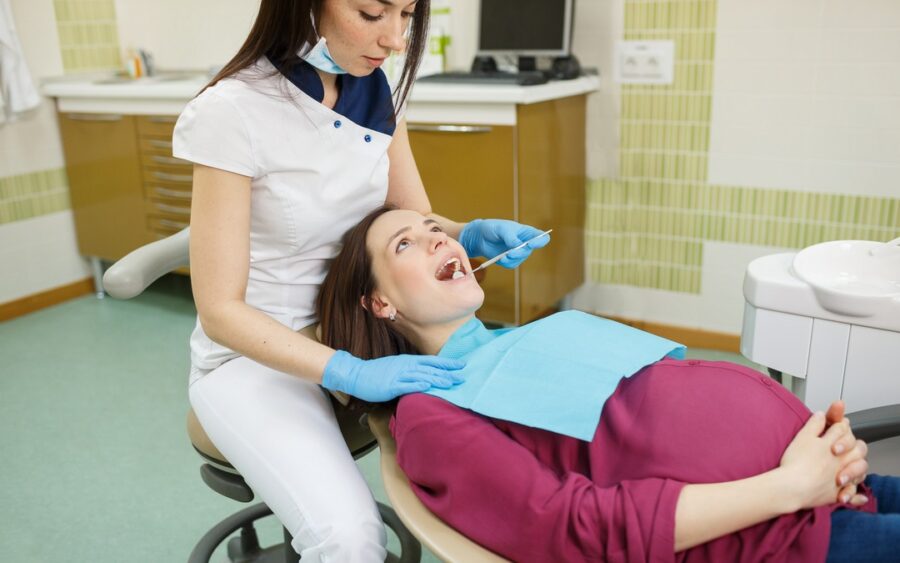Oral health during pregnancy is critical. Oral care should be part of our daily hygiene routine and especially at this stage.
Here's why:
During the prenatal period, women are exposed to certain factors that can affect their dental health. Some oral problems, such as excessive plaque build-up, can induce hormonal changes that could lead to premature delivery.
How does pregnancy affect your dental health?
Changes in your body during pregnancy can affect your teeth and gums. Here are some of the most significant issues:
- They increase the levels of hormones such as progesterone and estrogen. This can increase the risk of certain oral health problems.
- Your eating habits can change. During pregnancy there are usually some variations in your diet, increasing the consumption of some foods and decreasing others. The types of foods you eat can affect your oral health.
- Brushing and flossing during this period may be less frequent than before you became pregnant. This may be because your gums are sensitive or you are more tired than usual.
Main risks to oral health during pregnancy
These changes can increase the risk of certain oral problems during pregnancy. We highlight the most common ones.
Tooth decay
One of the causes of the appearance of cavities during pregnancy is the change in the composition of saliva, which becomes acidic, something very common during the last trimester and in the months of breastfeeding.
Also, the hormonal changes produced in pregnancy create a favorable environment for cavities and gingivitis to appear, since the blood supply of the tissues of the mouth is increased, making them more sensitive to external agents.
Gingivitis
During your pregnancy you may notice that your mouth has been changing. Gingivitis is one of the most frequent conditions in pregnant women, up to 60-70% of women suffer from it, generally from the third month onwards. Gingivitis in this period is related to the hormonal changes we have mentioned before, as well as to the excessive accumulation of plaque.
The most frequent signs and symptoms of this pathology are redness and inflammation of the gums, which cause them to become more sensitive and to bleed easily, even when you do not brush your teeth.
Periodontal disease
If gingivitis is not treated in time, it can progress, become worse and cause periodontitis or periodontal disease.
Periodontal disease is an infection that develops in the tissues that surround and support the teeth. If not treated early and progressed, periodontal disease can cause discomfort and bleeding of the gums, pain while chewing, and even tooth loss.
During pregnancy, due to strong hormonal changes, a weakening of the immune system can occur. If mild periodontitis occurs, combined with poor oral hygiene, having the lowest defenses can lead to the establishment of periodontitis and a more rapid progression of the disease.
There are studies that show that there is a relationship between this pathology and premature birth, so it is very important that you go to your dentist during pregnancy to prevent or treat any condition in time.
Pyogenic granulomas
These are non-cancerous tumors that form on the gums, usually between the teeth, that are red in appearance and bleed easily. They can be caused by bacterial plaque. They disappear on their own after giving birth. In exceptional cases, the specialist may have to remove them. Maintain a healthy mouth with daily care routines.
Discover our products for daily oral care

Dental Erosion
If you have vomiting due to morning sickness, your teeth may be exposed to too much stomach acid. If this is very frequent, the acid can deteriorate the enamel.
What are the signs and symptoms of dental problems during pregnancy?
If you have signs or symptoms of oral health problems during pregnancy, consult your dentist. The most common ones include:
- Bad breath.
- Loose teeth.
- Sores in the mouth or lumps in the gums
- New spaces between your teeth.
- receding gums or pus along the gum line
- Red, swollen, tender or shiny gums.
- Gums that bleed easily.
- Pain in one or more teeth
If you have any of these, go to your dentist as soon as possible, as you may have a condition that needs to be treated quickly to help prevent any complications. It is very important that you are aware of the importance of oral health during pregnancy.
You may be interested in: Daily oral health in adults
Follow us: Facebook, Twitter, Linkedin or Instagram


 How to relieve pain with newly placed braces?
How to relieve pain with newly placed braces? How to keep your breath fresh?
How to keep your breath fresh? 10 Tips to take care of the oral health of the little ones
10 Tips to take care of the oral health of the little ones





